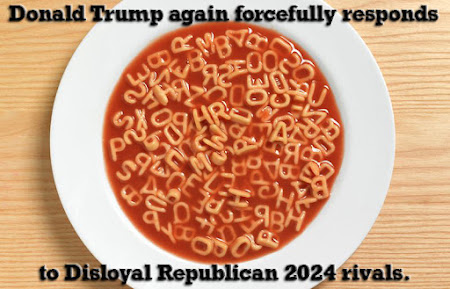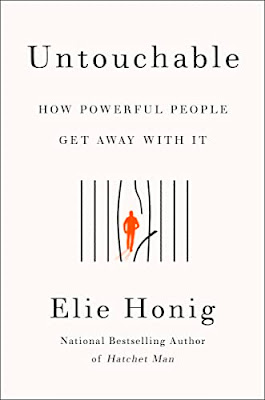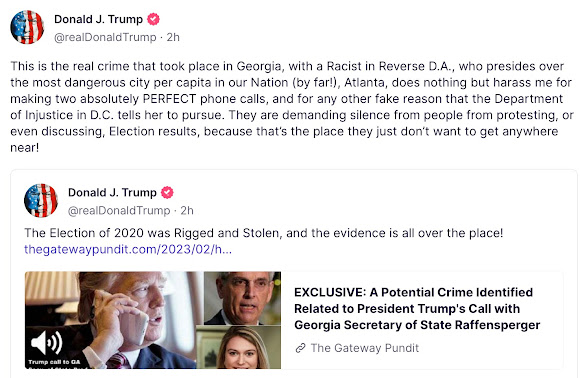is seriously mentally ill.
Up at 1 a.m. at Mar a Lago to rant incoherently on his "Truth Social" platform. It would be comical were it not so.
I highly recommend Elie Honig's new book.
Chapter 17Yeah.
United States v. Donald John Trump
Donald Trump has, as of this writing, never been charged with a crime. He has been investigated criminally at the federal level and in several states for crimes ranging from endangering-the-republic serious to the technical and obscure. But he has never been criminally charged, ever, with anything.
That’s a far cry, of course, from saying that Trump has never actually committed a crime. To the contrary, as I’ll argue here, he has committed many crimes, dozens even (depending how thinly we slice each of his criminal episodes into component parts), often in open public view. He has simply gotten away with it.
Trump might still face charges at some point; it’s possible he gets charged by somebody, somewhere, with something, between the writing of this book and publication. (The Fulton County district attorney in Georgia seems the most likely of anyone to file charges, as we’ll discuss in chapter 19.) But given the time that has lapsed, and the complex legal, structural, and political obstacles that any prosecution is certain to encounter, Trump’s ultimate conviction and imprisonment are now more the stuff of fantastical Twitter memes than reality.
So, looking back at Trump’s history of criminality, we need to consider the counterfactual. What charges might Trump have faced, in a (hypothetical) world where he received no formal legal protection while he was president, and none of the other advantages that bosses commonly enjoy and exploit, both during and after his presidency? What if Trump had done all he did, but was just an ordinary guy? And what if prosecutors had taken action quickly and decisively, without spinning their wheels for years and allowing the political landscape to shift under their feet?
Before we begin, I need to make this clear: I reject the casual assertion that a prosecution of Trump would be easy, or a given. I’ve worked long enough as a prosecutor to know that there’s no such thing as an automatic conviction, and that a criminal case against a former president would be extraordinarily difficult, regardless of the strength of the evidence. But we also need to move beyond the defeatist shrug of the shoulders—“Well, it’s complicated, he was the president, it’s never been done before, it’ll cause dissension, what are you gonna do?” There’s a substantive discussion to be had between these poles.
We do not, of course, have all the facts that were available to prosecutors—or would have been available, had they opened criminal investigations and pursued them in a timely and aggressive manner. But we do know an awful lot, often more than enough to conclude with confidence that Trump did in fact commit a particular crime.
We know about Trump’s conduct, first, because journalism about his misdeeds has been remarkable for its scope, depth, and accuracy. There have been sporadic misfires, but by and large, media reporting about Trump’s conduct has been spot-on, and countless scoops have later been definitively confirmed. Of course we’ll rely here only on those factual allegations that have now been established beyond serious dispute.
Over time, even more evidence has entered the public domain. Grand jury materials have now been publicly disclosed, as criminal cases against Trump’s cohorts (and, at times, co-conspirators) have progressed and concluded. Judges have ordered the Justice Department to turn over internal documents to Congress, media outlets, and public transparency advocates. Congress, inspectors general, and others have uncovered new evidence through their investigative work; the House January 6 Select Committee has uncovered particularly damning evidence about Trump’s quest to steal the 2020 election. People who were directly involved in Trump’s crimes, or witnessed them, have come forward (at times, conveniently, just a bit too late for prosecutors or other investigators to make meaningful use of their information). Heck, Trump himself has openly admitted much of his wrongdoing—bragged about it, even—in his tweets (pre-ban) and other public statements. The amount and quality of evidence varies by crime, but we have an ample factual record to proceed here…
Honig, Elie. Untouchable (pp. 201-203). HarperCollins. Kindle Edition.
And, then, there's this mess. Fox News execs and show hosts caught red-handed via the Dominion defamation lawsuit discovery process stating multiple times off the record that they knew the Trump "stolen election" allegations had zero credible evidence justifying them.
So, you'll enjoy this: we put what Fox hosts Carlson, Hannity, and Ingraham said, on air, side by side with what they were saying to each other on text, in private, when the cameras stopped rolling.
— Mehdi Hasan (@mehdirhasan) February 18, 2023
It's a must-watch and it's pretty shocking:pic.twitter.com/tkrkzpF5tY
ERRATUM
OK, then…
Running for President? Lordy.
ON DECK
Release date Feb 21, 2023
 |
| Click cover image |
"A carefully researched work of intellectual history, and an urgently needed political analysis." --Jane MayerRecall my coverage of Dr. Oreskes' prior book “Why Trust Science?”
“[A] scorching indictment of free market fundamentalism … and how we can change, before it's too late.”-Esquire, Best Books of Winter 2023
The bestselling authors of Merchants of Doubt offer a profound, startling history of one of America's most tenacious--and destructive--false ideas: the myth of the "free market."
In their bestselling book Merchants of Doubt, Naomi Oreskes and Erik M. Conway revealed the origins of climate change denial. Now, they unfold the truth about another disastrous dogma: the “magic of the marketplace.”
In the early 20th century, business elites, trade associations, wealthy powerbrokers, and media allies set out to build a new American orthodoxy: down with “big government” and up with unfettered markets. With startling archival evidence, Oreskes and Conway document campaigns to rewrite textbooks, combat unions, and defend child labor. They detail the ploys that turned hardline economists Friedrich von Hayek and Milton Friedman into household names; recount the libertarian roots of the Little House on the Prairie books; and tune into the General Electric-sponsored TV show that beamed free-market doctrine to millions and launched Ronald Reagan's political career.
By the 1970s, this propaganda was succeeding. Free market ideology would define the next half-century across Republican and Democratic administrations, giving us a housing crisis, the opioid scourge, climate destruction, and a baleful response to the Covid-19 pandemic. Only by understanding this history can we imagine a future where markets will serve, not stifle, democracy.
Waiting impatiently to download and study.
UPDATE ON THE MENTALLY ILL DONALD
Sir, your neurological calamity is still covered by Obamacare.
__________






No comments:
Post a Comment